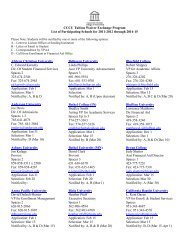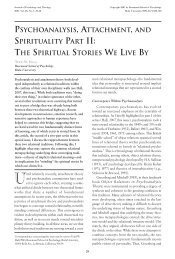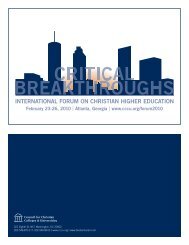The Spiritual Life of College Students - Council for Christian ...
The Spiritual Life of College Students - Council for Christian ...
The Spiritual Life of College Students - Council for Christian ...
You also want an ePaper? Increase the reach of your titles
YUMPU automatically turns print PDFs into web optimized ePapers that Google loves.
A National Study <strong>of</strong><strong>College</strong> <strong>Students</strong>’ Search<strong>for</strong> Meaning and PurposeExecutive SummaryHigher Education Research InstituteGraduate School <strong>of</strong> Education & In<strong>for</strong>mation StudiesUniversity <strong>of</strong> Cali<strong>for</strong>nia, Los Angeles
<strong>The</strong> ProjectIn 2003, the Higher Education Research Institute (HERI) at UCLA began a major, multi-year research project toexamine the spiritual development <strong>of</strong> undergraduate students during their college years. Funded by the JohnTempleton Foundation, the study is designed to enhance our understanding <strong>of</strong> how college students conceive<strong>of</strong> spirituality, the role it plays in their lives, and how colleges and universities can be more effective in facilitatingstudents’ spiritual development.As the project’s Co-Principal Investigators, Alexander Astin and Helen Astin, wrote:<strong>The</strong> project is based in part on the realization that the relative amount <strong>of</strong> attention thatcolleges and universities devote to the ‘exterior’ and ‘interior’ aspects <strong>of</strong> students’ developmenthas gotten out <strong>of</strong> balance...we have increasingly come to neglect the student’sinner development—the sphere <strong>of</strong> values and beliefs, emotional maturity, spirituality, andself-understanding.*<strong>The</strong> ResearchThis report summarizes findings from a survey <strong>of</strong> 112,232 entering first-year students attending 236 diversecolleges and universities across the country. <strong>The</strong> fall 2004 <strong>College</strong> <strong>Students</strong>’ Beliefs and Values (CSBV) Surveywas administered to entering first-year students as a two-page addendum to the traditional four-page freshmansurvey conducted by UCLA’s Cooperative Institutional Research Program (CIRP). <strong>The</strong> 2004 CIRP/CSBV freshmansurvey included approximately 160 items that pertained directly to students’ perspectives and practices withrespect to spirituality and religion. An initial pilot survey <strong>of</strong> 3,680 third-year students at 46 colleges anduniversities was completed in 2003. (Additional in<strong>for</strong>mation on the methodology is available in the full report,or at www.spirituality.ucla.edu.)A follow-up survey, which will be administered to this year’s first-year students in Spring 2007 when they arejuniors, will be used to study changes in these students’ spiritual/religious development during their undergraduateyears. Faculty perspectives on spirituality and the undergraduate curriculum will also be examined.Higher Education Research InstituteHERI is widely regarded as one <strong>of</strong> the premiere research and policy organizations on postsecondary educationin the country. Housed at the Graduate School <strong>of</strong> Education & In<strong>for</strong>mation Studies at UCLA, it serves as aninterdisciplinary center <strong>for</strong> research, evaluation, in<strong>for</strong>mation, policy studies, and research training in postsecondaryeducation. Its Cooperative Institutional Research Program (CIRP) annual Survey <strong>of</strong> Entering Freshmeninitiated in 1966 is one <strong>of</strong> the most widely used sources <strong>of</strong> in<strong>for</strong>mation about colleges and college students inthe nation. HERI's research program covers a variety <strong>of</strong> topics including the outcomes <strong>of</strong> postsecondary education,leadership development, faculty per<strong>for</strong>mance, federal and state policy, and educational equity.UCLA Pr<strong>of</strong>essors Alexander W. Astin and Helen S. Astin are Co-Principal Investigators <strong>of</strong> the project.Dr. Jennifer A. Lindholm is the Project Director. Dr. Alyssa N. Bryant is a Postdoctoral Fellow, and KatalinSzelényi and Shannon Calderone are Research Analysts.<strong>The</strong> opinions expressed in this report are those <strong>of</strong> the authors and do not necessarily reflect the views <strong>of</strong> theJohn Templeton Foundation.*<strong>The</strong> Dallas Morning News, November 29, 2003
<strong>The</strong> <strong>Spiritual</strong> <strong>Life</strong> OF COLLEGE STUDENTSExecutive SummaryWhat is the meaning <strong>of</strong> college?What am I going to do with my life?How will I know I am going the ‘right’ way?What kind <strong>of</strong> persondo I want to be?How is everything I’ve worked <strong>for</strong> up to thispoint going to contribute back to society?How am I going to leave my markwhen I finally pass away?—Student Voices 1In 2003, the Higher Education Research Institute(HERI) at UCLA launched a major, multi-yearprogram <strong>of</strong> research to examine the spiritualdevelopment <strong>of</strong> undergraduate students during theircollege years. <strong>The</strong> study, funded by the John TempletonFoundation, is designed to enhance our understanding<strong>of</strong> how college students conceive <strong>of</strong> spirituality, therole it plays in their lives, and how colleges anduniversities can be more effective in facilitatingstudents’ spiritual development. Given the broad<strong>for</strong>mative roles that colleges and universities play inour society, higher education represents a criticalfocal point <strong>for</strong> responding to the question <strong>of</strong> how tobalance the “exterior” and “interior” aspects <strong>of</strong> lifemore effectively.Building on the growing interest on college campusesto include spiritual development as a core component<strong>of</strong> a liberal arts education, the study employs amulti-institutional and longitudinal design to identifytrends, patterns, and principles <strong>of</strong> spirituality andreligiousness among college students.This executive summary provides a brief overview <strong>of</strong>key findings based on data collected in late summerand early fall 2004 from more than 112,000 studentsattending a national sample <strong>of</strong> 236 colleges anduniversities. <strong>Students</strong> responded to a six-page surveythat queried their backgrounds, educational andoccupational aspirations, and values and beliefs withrespect to spiritual and religious matters.<strong>The</strong> study reveals that today’s college students havevery high levels <strong>of</strong> spiritual interest and involvement.Many are actively engaged in a spiritual quest and inexploring the meaning and purpose <strong>of</strong> life. <strong>The</strong>y arealso very engaged and involved in religion, reportingconsiderable commitment to their religious beliefsand practices.As they begin college, freshmen have high expectations<strong>for</strong> the role their institutions will play in theiremotional and spiritual development. <strong>The</strong>y placegreat value on their college enhancing their selfunderstanding,helping them develop personal values,and encouraging their expression <strong>of</strong> spirituality.1 <strong>The</strong>se are reflections <strong>of</strong> students during focus group interviews.
<strong>Spiritual</strong> Searchand Religious Engagement<strong>College</strong> students report high levels <strong>of</strong> spirituality andidealism. <strong>The</strong>y espouse many spiritual and religiousvalues and virtues.◗ <strong>College</strong> students show a high degree <strong>of</strong> spiritualinterest and involvement. Three-fourths say that theyare “searching <strong>for</strong> meaning/purpose in life” or thatthey have discussions about the meaning <strong>of</strong> life withfriends, and similar numbers have high expectationsthat college will help them develop emotionally andspiritually. Many are engaged in a spiritual quest,with nearly half reporting that they consider it“essential” or “very important” to seek opportunitiesto help them grow spiritually.◗ Eight students in ten attended religious servicesduring the past year and similar numbers discussedreligion with both friends and family. More thantwo-thirds pray, and four in ten consider it veryimportant that they follow religious teachings intheir everyday life.◗ Almost eight students in ten believe in God, withmore than half perceiving God as “love” or as the“creator,” and about half experiencing God as a“protector.”◗ <strong>Students</strong> get a great deal <strong>of</strong> com<strong>for</strong>t from theirspiritual/religious beliefs, with more than two-thirdsreporting that they derive strength, support, andguidance from such beliefs. About two-thirds saythat they gain spiritual strength by trusting in aHigher Power, and close to one-half say that they“frequently” feel loved by God.◗ When asked about their spiritual/religious views,four students in ten indicate that they feel “secure,”one in four says they are “seeking,” one in fourreports being either “conflicted” or “doubting,”and one in seven is “not interested.”Measuring <strong>Spiritual</strong>ityand Religiousness<strong>Spiritual</strong>ity and religiousness are multidimensional,finding expression in a variety <strong>of</strong> beliefs andeveryday practices.◗ For this study, HERI researchers developed threemeasures <strong>of</strong> spirituality (<strong>Spiritual</strong>ity, <strong>Spiritual</strong> Quest,and Equanimity), five measures <strong>of</strong> religiousness(Religious Commitment, Religious Engagement,Religious/Social Conservatism, Religious Skepticism,and Religious Struggle), and four other dimensionsthat were expected to be related to spiritualityand religiousness (Charitable Involvement,Compassionate Self-Concept, Ethic <strong>of</strong> Caring,and Ecumenical Worldview).Indicators <strong>of</strong> <strong>Students</strong>’ <strong>Spiritual</strong>ityIndicatorPercentBelieve in the sacredness <strong>of</strong> life . . . . . . . . . . . . . . . . . . . . . . . . . . . . . . . . . . . . . . . . . . . . . 83 *Have an interest in spirituality . . . . . . . . . . . . . . . . . . . . . . . . . . . . . . . . . . . . . . . . . . . . . . 80 *Search <strong>for</strong> meaning/purpose in life . . . . . . . . . . . . . . . . . . . . . . . . . . . . . . . . . . . . . . . . . . . 76 *Have discussions about the meaning <strong>of</strong> life with friends. . . . . . . . . . . . . . . . . . . . . . . . . . . 74 *My spirituality is a source <strong>of</strong> joy. . . . . . . . . . . . . . . . . . . . . . . . . . . . . . . . . . . . . . . . . . . . . 64 **Seek out opportunities to help me grow spiritually . . . . . . . . . . . . . . . . . . . . . . . . . . . . . . . 47 **** Describes students to some or a great extent** Agree strongly or somewhat*** Consider it essential or very important
◗ <strong>Students</strong> who are strongly religious also tend tobe highly spiritual. However, <strong>Spiritual</strong>ity is muchmore closely associated with <strong>Spiritual</strong> Quest, Ethic<strong>of</strong> Caring, Compassionate Self-Concept, andEcumenical Worldview than is either ReligiousCommitment or Religious Engagement. ReligiousCommitment and Engagement, on the otherhand, are much more closely associated withReligious/Social Conservatism and (negatively)with Religious Skepticism.Political Orientationand AttitudesWhile there is a political divide on some issuesbetween students at different levels <strong>of</strong> <strong>Spiritual</strong>ityand Religious Engagement, there is also convergenceon a number <strong>of</strong> social concerns and on the ideals,virtues, and values that students espouse.◗ Among students who show high levels <strong>of</strong>Religious Engagement, conservatives outnumberliberals by better than 3 to 1. Conservatives alsooutnumber liberals among students with highscores on <strong>Spiritual</strong>ity, although the differencesare not as large.◗ <strong>The</strong>re are roughly equal numbers <strong>of</strong> conservativesand liberals among students who earn high scoreson either Charitable Involvement or CompassionateSelf-Concept. However, liberals substantiallyoutnumber conservatives among those with highscores on Ethic <strong>of</strong> Caring (2 to 1) and Ecumenicalworldview (3 to 1).◗ Issues such as abortion, the legalization <strong>of</strong>marijuana, casual sex, and the legal sanctioning<strong>of</strong> same-sex relationships are highly divisive <strong>for</strong>students who fall at the extremes <strong>of</strong> spirituality andreligiousness. Thus, students who are highly engagedreligiously, compared to their classmates with lowlevels <strong>of</strong> engagement, are much less likely to supportkeeping abortion legal, engaging in casual sex,allowing same-sex couples to have legal maritalstatus, and legalizing marijuana. Religiouslyengaged and, to a lesser extent, highly spiritualstudents also take relatively conservative positionson issues such as military spending and taxation.◗ Highly religious and highly spiritual students do not,however, subscribe to a uni<strong>for</strong>m set <strong>of</strong> conservativeviewpoints. Thus, while support <strong>for</strong> affirmativeaction and opposition to the death penalty havetypically been considered “liberal” positions withinthe current national political discourse, highlyreligious and highly spiritual students actuallyassume relatively liberal perspectives on these twoissues. Further, highly spiritual and highly religiousstudents do not differ appreciably from their lowscoringcounterparts when it comes to the issues<strong>of</strong> race, criminals' rights, the role <strong>of</strong> women, andgun control.◗ Highly religiously engaged and highly spiritualstudents support greater involvement by campusesin curtailing racist/sexist speech as well as inbanning extreme speakers.<strong>Spiritual</strong>ity, Religiousness,and Well-BeingWhile spirituality and religiousness generally relateto physical well-being, the relationships with psychologicalhealth are nuanced and complex.◗ Highly spiritual students are not immune to thepsychological stressors <strong>of</strong> life: When comparedto their less spiritual classmates, highly spiritualstudents are slightly less likely to exhibit positivepsychological health. On the other hand, highlyspiritual students are much more likely thanless spiritual students to evidence Equanimity, atrait defined by qualities such as “being able t<strong>of</strong>ind meaning in times <strong>of</strong> hardship” and “feelingat peace/centered.” In other words, although<strong>Spiritual</strong>ity and psychological distress are positivelylinked, so are <strong>Spiritual</strong>ity and mechanisms <strong>for</strong>coping with hardship.◗ A nearly identical pattern—greater psychologicaldistress combined with the ability to find meaningin hardship and a sense <strong>of</strong> peace—is also evident <strong>for</strong>those students whose spirituality manifests itselfin being committed to Charitable Involvement,exhibiting an Ethic <strong>of</strong> Caring, and holding to anEcumenical Worldview.
◗ In contrast to <strong>Spiritual</strong>ity, general psychologicalhealth shows either no relationship, or a slightlypositive relationship, to Religious Commitmentand Religious Engagement.◗ Both spirituality and religiousness generally showpositive associations with various measures <strong>of</strong> physicalwell-being. Specifically, highly spiritual andhighly religious students are more likely than theirleast spiritual and religious classmates to abstainfrom alcohol and cigarettes, to maintain a healthydiet, and to report “above average” physical healthrelative to peers.◗ By contrast, students who are experiencingsignificant Religious Struggle, compared to thosereporting little or no struggle, are more likely todrink, smoke cigarettes, stay up all night, and missschool because <strong>of</strong> illness, and less likely to maintaina healthy diet and to rate their physical healthas “above average.”Religious Preference<strong>The</strong>re is a wealth <strong>of</strong> diversity in students' religiousbeliefs and practices.◗ <strong>Students</strong>' religious preferences were classified into19 different categories. <strong>The</strong> highest percentage <strong>of</strong>entering freshmen is Roman Catholic (28%), followedby mainline Protestant faiths (17%), “None”(17%), Baptist (13%), and “other <strong>Christian</strong>” (11%).About one-fourth (26%) say that they considerthemselves to be born-again <strong>Christian</strong>s.◗ <strong>The</strong>re are at least two clear-cut clusters <strong>of</strong> religiouspreferences. <strong>The</strong> first—including Mormons, 7th DayAdventists, Baptists, and “other <strong>Christian</strong>s”—isstrongly spiritual, religious, and religiously/sociallyconservative and expresses little ReligiousSkepticism. <strong>The</strong> second—including Unitarians,Buddhists, Hindus, Episcopalians, Eastern Orthodoxand Jewish students—tends to score low onreligiousness and high on Religious Skepticism,Ecumenical Worldview, Ethic <strong>of</strong> Caring, andCharitable Involvement.◗ Mormons receive the highest scores <strong>of</strong> all groupson five <strong>of</strong> 12 measures and above average scores onthree more. <strong>Students</strong> with no religious preferenceshow a pattern that is the reverse <strong>of</strong> Mormons,<strong>of</strong>fering a sharp contrast on most measures.Unitarians produce the most distinctive pattern,earning high scores on <strong>Spiritual</strong>ity, <strong>Spiritual</strong> Quest,Ethic <strong>of</strong> Caring, and Ecumenical Worldview and lowscores on Religious Commitment and Engagement.◗ Baptists tend to score high on ReligiousCommitment, Religious Engagement,Religious/Social Conservatism, <strong>Spiritual</strong>ity, andEquanimity, while having the lowest score onEcumenical Worldview. <strong>The</strong> “other <strong>Christian</strong>”group is virtually identical to Baptists.◗ Roman Catholics tend to score below the overallaverage on Religious Commitment, ReligiousEngagement, Religious/Social Conservatism,and Religious Skepticism.A copy <strong>of</strong> the full report is available at www.spirituality.ucla.edu,or by contacting us at heri@ucla.edu or 310.825.1925.
National Advisory BoardRebecca S. ChoppPresident, Colgate UniversityJames W. Fowler, C.H.Candler Pr<strong>of</strong>essor <strong>of</strong> <strong>The</strong>ology and HumanDevelopment, Emory UniversityClaire L. GaudianiHeyman Center <strong>for</strong> Philanthropy and FundraisingNew York UniversityFormer President, Connecticut <strong>College</strong>Nathan O. HatchProvost, University <strong>of</strong> Notre DameArthur LevinePresident, Teachers <strong>College</strong>, Columbia UniversityDavid K. ScottFormer Chancellor, University <strong>of</strong> Massachusetts,AmherstHuston SmithPr<strong>of</strong>essor Emeritus, Syracuse UniversityBeverly TatumPresident, Spelman <strong>College</strong>Diana Chapman WalshPresident, Wellesley <strong>College</strong>William H. WillimonPr<strong>of</strong>essor <strong>of</strong> <strong>Christian</strong> Ministry, Duke UniversityCarol Geary SchneiderPresident, Association <strong>of</strong>American <strong>College</strong>s and UniversitiesTechnical Advisory PanelJohn A. AstinResearch Scientist, Cali<strong>for</strong>nia Pacific Medical CenterArthur W. ChickeringVisiting Distinguished Pr<strong>of</strong>essor, Vermont <strong>College</strong>,Union Institute and UniversityPeter C. HillPr<strong>of</strong>essor <strong>of</strong> Psychology, Biola UniversityEllen L. IdlerChair, Department <strong>of</strong> Sociology, Rutgers, <strong>The</strong> StateUniversity <strong>of</strong> New JerseyCynthia S. JohnsonSenior Scholar in Residence, American <strong>College</strong>Personnel AssociationMichael E. McCulloughAssociate Pr<strong>of</strong>essor <strong>of</strong> Psychology andReligious Studies, University <strong>of</strong> MiamiReverend William (Scotty) L. McLennan, Jr.Dean, Religious <strong>Life</strong>, Stan<strong>for</strong>d UniversityKenneth I. PargamentPr<strong>of</strong>essor <strong>of</strong> Psychology, Bowling Green StateUniversity<strong>Christian</strong> SmithPr<strong>of</strong>essor and Associate Chair <strong>of</strong> Sociology,University <strong>of</strong> North Carolina, Chapel Hill
www.spirituality.ucla.eduPhone: 310.825.1925E-mail: heri@ucla.edu


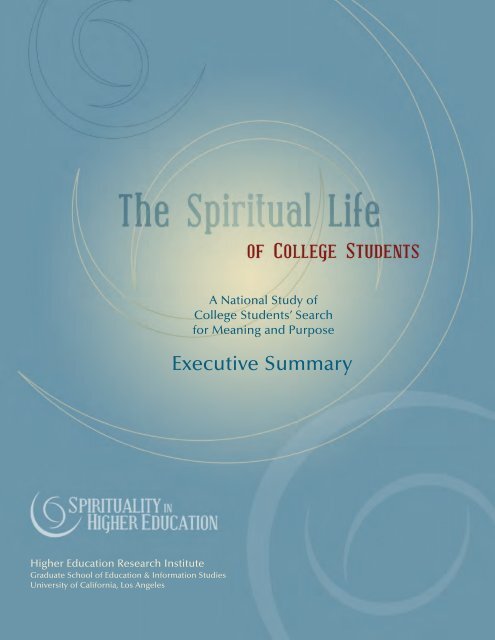
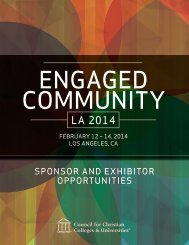
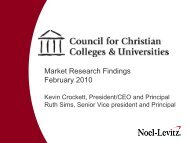
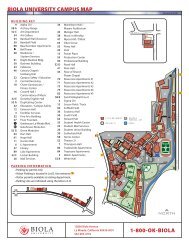

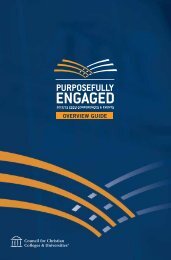

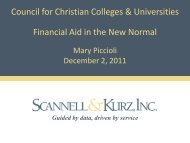
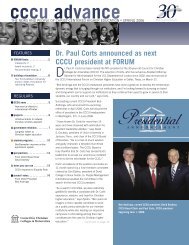
![Download Guide [PDF] - Council for Christian Colleges & Universities](https://img.yumpu.com/37211849/1/190x245/download-guide-pdf-council-for-christian-colleges-universities.jpg?quality=85)
